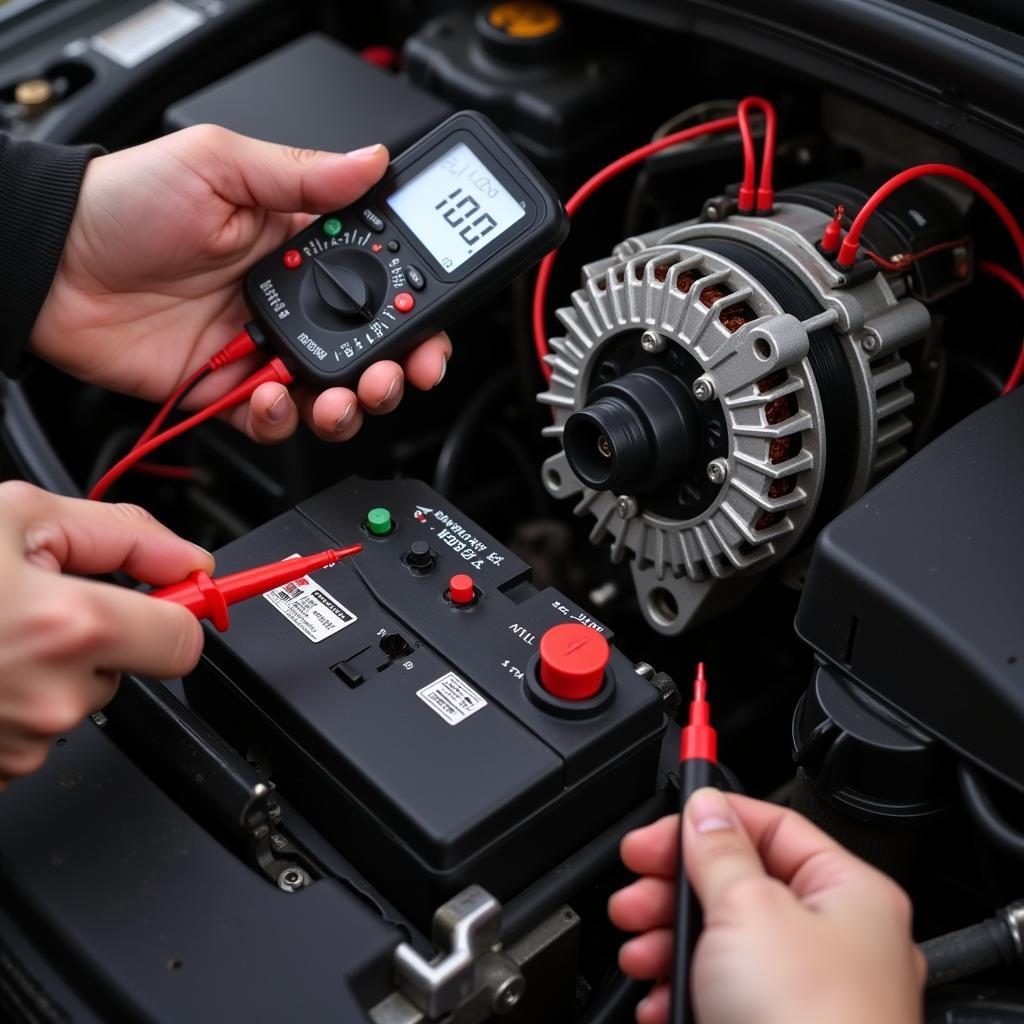Diagnosing car A/C problems can be frustrating, especially during a hot summer day. This guide provides a step-by-step approach to help car owners, mechanics, and technicians effectively diagnose and troubleshoot their vehicle’s air conditioning system.
Do you find yourself sweating more than usual while driving? Is your car’s A/C blowing lukewarm air instead of the arctic blast you expect? Then it’s time to diagnose car a/c problems. A malfunctioning A/C system can significantly impact driving comfort, especially in warmer climates. This guide will equip you with the knowledge and tools to identify the root cause of your A/C woes.
Understanding Your Car’s A/C System
Before we dive into diagnosing specific problems, it’s helpful to understand the basic components and functionality of a car’s A/C system. The system consists of a compressor, condenser, evaporator, expansion valve or orifice tube, and refrigerant. These components work together to remove heat and humidity from the cabin air, providing cool and comfortable driving conditions.
Key Components and Their Functions
- Compressor: The compressor is the heart of the system, compressing the refrigerant and circulating it throughout the system.
- Condenser: The condenser releases the heat absorbed by the refrigerant, converting it from a high-pressure gas to a high-pressure liquid.
- Evaporator: The evaporator absorbs heat from the cabin air, cooling it down and releasing cool air into the vehicle’s interior.
- Expansion Valve/Orifice Tube: This component regulates the flow of refrigerant into the evaporator.
- Refrigerant: The refrigerant is the substance that carries heat and allows for the cooling process.
Common Car A/C Problems and Solutions
Several issues can cause your car’s A/C to malfunction. Here’s a breakdown of common problems, their potential causes, and how to troubleshoot car a c problem:
Low Refrigerant
One of the most common causes of a poorly performing A/C system is low refrigerant. This can be due to leaks in the system or simply needing a recharge. Symptoms include weak airflow and lukewarm air.
Compressor Issues
A failing compressor can also lead to A/C problems. Signs of a bad compressor include unusual noises, leaks, and a complete lack of cold air.
Electrical Problems
Electrical issues, such as a faulty relay, blown fuse, or wiring problems, can disrupt the power supply to the A/C system.
Clogged Condenser or Evaporator
A clogged condenser or evaporator can restrict airflow and reduce cooling efficiency.
How to Diagnose Car A/C Problems
Now, let’s dive into how to Diagnose Car A/c Problems. You can perform some basic checks yourself before seeking professional help.
-
Check the Airflow: Start by turning on your A/C and checking the airflow from the vents. Weak airflow could indicate a clogged filter, blower motor issue, or low refrigerant.
-
Feel the Air Temperature: Is the air coming out lukewarm or not cold at all? This could point to low refrigerant, a faulty compressor, or problems with the expansion valve/orifice tube.
-
Listen for Unusual Noises: Pay attention to any unusual noises coming from the A/C system. Clicking, hissing, or grinding sounds could indicate a failing compressor or other mechanical problems.
-
Check for Leaks: Inspect the A/C components for any signs of leaks, such as oily residue or refrigerant stains.
“A thorough inspection and systematic approach are crucial for accurately diagnosing car A/C issues,” says automotive expert, Michael Johnson, ASE Certified Master Technician.
Conclusion
Diagnosing car A/C problems requires a systematic approach and understanding of the system’s components. By following the steps outlined in this guide, you can effectively identify the root cause of your A/C issues and take appropriate action. If you’re still having trouble, don’t hesitate to contact AutoTipPro for professional assistance. We are located at 500 N St Mary’s St, San Antonio, TX 78205, United States, and can be reached at +1 (641) 206-8880.
“Remember, preventative maintenance, such as regular A/C system checks and refrigerant top-ups, can prevent many common problems and keep your car cool and comfortable year-round,” adds Johnson. He also recommends checking your car’s brakes for optimal performance, as discussed in our article on problems with car brakes. Sometimes, car problems can arise from unexpected issues, such as those experienced by some drivers in Seaside, Florida, as highlighted in our article on seaside florida car problem. If you’re experiencing driving issues with your summer car, our article on how to fix my summer car not driving problem might provide valuable insights.





Leave a Reply